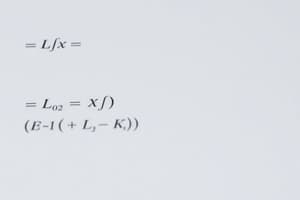Podcast
Questions and Answers
¿Cómo se representa geométricamente la derivada de una función?
¿Cómo se representa geométricamente la derivada de una función?
- El valor acumulado de la función
- El área bajo la curva de la función
- La pendiente de la recta secante a la gráfica de la función
- La pendiente de la recta tangente a la gráfica de la función (correct)
¿Cuál es la notación común para representar la integral definida de una función?
¿Cuál es la notación común para representar la integral definida de una función?
- \( \lim_{x \to c} f(x) \)
- \( \int f(x) \, dx \) (correct)
- \( \frac{df}{dx} \)
- \( f''(x) \)
¿Cuál es el propósito principal de los límites en cálculo?
¿Cuál es el propósito principal de los límites en cálculo?
- Modelar y analizar sistemas económicos
- Determinar la tasa de cambio de una función
- Analizar el comportamiento de una función a medida que el input se acerca a cierto valor (correct)
- Calcular el área bajo la curva de una función
¿En qué campo se emplea el cálculo para analizar movimiento, electricidad y magnetismo?
¿En qué campo se emplea el cálculo para analizar movimiento, electricidad y magnetismo?
¿Cuál es uno de los roles cruciales del cálculo en ciencias de la computación?
¿Cuál es uno de los roles cruciales del cálculo en ciencias de la computación?
Flashcards are hidden until you start studying
Study Notes
Understanding Calculus in Mathematics
Calculus, a fundamental branch of mathematics, is an area of study that focuses on the properties and applications of derivatives and integrals of functions. It is a crucial tool in various fields such as physics, engineering, economics, and computer science. In this article, we will delve into the basics of calculus, its significance, and some of its key concepts.
What is Calculus?
Calculus can be broadly classified into two main branches: differential calculus and integral calculus. Differential calculus primarily deals with the concept of the derivative, which represents the rate of change of a function. On the other hand, integral calculus focuses on the concept of the integral, which provides a way to compute the accumulation of quantities. Both of these branches are interconnected and form the foundation of calculus.
Significance of Calculus
The development of calculus revolutionized the field of mathematics and its applications. It provides a framework for understanding change and motion, making it indispensable in the natural sciences and engineering. Calculus enables us to solve problems that involve varying quantities, such as finding the velocity of an object, determining the area under a curve, and optimizing functions.
Key Concepts in Calculus
Derivatives
The derivative of a function represents the rate at which the function's value changes with respect to its input. Geometrically, it corresponds to the slope of the tangent line to the graph of the function at a specific point. The derivative is denoted by ( f'(x) ) or ( \frac{df}{dx} ), and it provides valuable information about the behavior of the function.
Integrals
An integral is a mathematical concept that represents the accumulation of quantities. It is used to find the area under a curve and to compute the total change of a quantity over a given interval. The definite integral of a function ( f(x) ) over the interval ([a, b]) is denoted by ( \int_{a}^{b} f(x) , dx ), and it yields the net area between the curve and the x-axis within the specified interval.
Limits
Limits are a fundamental concept in calculus that describes the behavior of a function as the input approaches a certain value. They are essential for defining derivatives and integrals and are used to study the behavior of functions near specific points. The limit of a function ( f(x) ) as ( x ) approaches a value ( c ) is denoted by ( \lim_{x \to c} f(x) ).
Applications of Calculus
Calculus has diverse applications across various fields. In physics, it is used to analyze motion, electricity, and magnetism. Engineers rely on calculus to design structures, optimize systems, and solve differential equations. In economics, calculus is employed to model and analyze economic systems. Moreover, calculus plays a crucial role in computer science, particularly in the field of algorithms and computational complexity.
Conclusion
In conclusion, calculus is a powerful and versatile branch of mathematics that provides a framework for understanding change and accumulation. Its concepts, such as derivatives, integrals, limits, and applications, have far-reaching implications in numerous disciplines. By mastering calculus, individuals gain the ability to model, analyze, and solve a wide range of problems, making it an indispensable tool in the modern world.
Studying That Suits You
Use AI to generate personalized quizzes and flashcards to suit your learning preferences.




